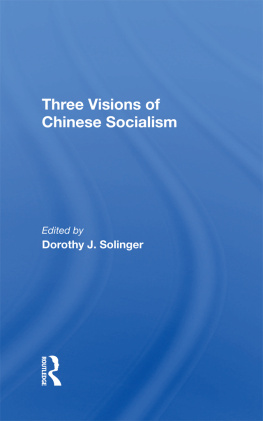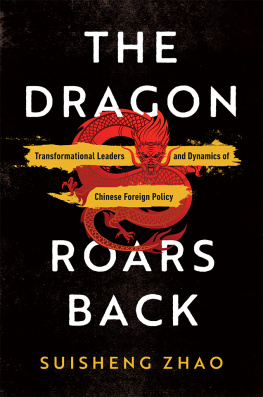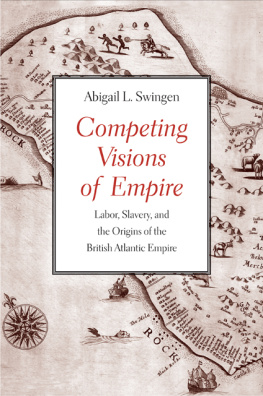Three Visions of Chinese Socialism
Westview Replica Editions
The concept of Westview Replica Editions is a response to the continuing crisis in academic and informational publishing. Library budgets for books have been severely curtailed. Ever larger portions of general library budgets are being diverted from the purchase of books and used for data banks, computers, micromedia, and other methods of information retrieval. Interlibrary loan structures further reduce the edition sizes required to satisfy the needs of the scholarly community. Economic pressures on the university presses and the few private scholarly publishing companies have severely limited the capacity of the industry to properly serve the academic and research communities. As a result, many manuscripts dealing with important subjects, often representing the highest level of scholarship, are no longer economically viable publishing projects--or, if accepted for publication, are typically subject to lead times ranging from one to three years.
Westview Replica Editions are our practical solution to the problem. We accept a manuscript in camera-ready form, typed according to our specifications, and move it immediately into the production process. As always, the selection criteria include the importance of the subject, the work's contribution to scholarship, and its insight, originality of thought, and excellence of exposition. The responsibility for editing and proofreading lies with the author or sponsoring institution. We prepare chapter headings and display pages, file for copyright, and obtain Library of Congress Cataloging in Publication Data. A detailed manual contains simple instructions for preparing the final typescript, and our editorial staff is always available to answer questions.
The end result is a book printed on acid-free paper and bound in sturdy library-quality soft covers. We manufacture these books ourselves using equipment that does not require a lengthy make-ready process and that allows us to publish first editions of 300 to 600 copies and to reprint even smaller quantities as needed. Thus, we can produce Replica Editions quickly and can keep even very specialized books in print as long as there is a demand for them.
About the Book and Editor
Three Visions of Chinese Socialism
edited by Dorothy J. Solinger
For many years, most scholarly and journalistic interpretation of Chinese politics has followed the practice of the media in the People's Republic, analyzing conflict among the leadership in terms of a dichotomy between two "lines," or the "two-line struggle." The adherents of this model refer to the two lines as "ideologues" or "radicals" on the one hand, versus "pragmatists" or "moderates" on the other. The ideologues are those who attempt prematurely to manage China as if it were already communist; the pragmatists, those who stress bolstering economic growth as the means for ultimately realizing the communist vision.
In this book, the authors propose that Chinese politics can more fruitfully be assessed in light of a clash among three, rather than two, competing "visions." Policy conflicts, they conclude, occur because of disagreements over the priorities to set among three competing values--productivity; mass participation and mobilization; and order. Each author analyzes debates over market, mobilizational, and bureaucratic approaches in a particular policy sector, demonstrating how differing visions have influenced policy formation. The sectors discussed are political organization, commerce, culture, and foreign policy. An introductory chapter offers a critique of the "three-line" model and of the three disparate approaches to achieving socialism in China.
Dorothy J. Solinger is associate director of the Asian Studies Program and adjunct associate professor in the Department of Political Science at the University of Pittsburgh. Her publications include Regional Government and Political Integration in Southwest China, 1949-1954: A Case Study (1977) and Chinese Business Under Socialism: The Politics of Domestic Commerce, 1949-1980 (1983).
Three Visions of Chinese Socialism
edited by
Dorothy J. Solinger
First published 1984 by Westview Press, Inc.
Published 2019 by Routledge
52 Vanderbilt Avenue, New York, NY 10017
2 Park Square, Milton Park, Abingdon, Oxon OX14 4RN
Routledge is an imprint of the Taylor & Francis Group, an informa business
Copyright 1984 Taylor & Francis
All rights reserved. No part of this book may be reprinted or reproduced or utilised in any form or by any electronic, mechanical, or other means, now known or hereafter invented, including photocopying and recording, or in any information storage or retrieval system, without permission in writing from the publishers.
Notice:
Product or corporate names may be trademarks or registered trademarks, and are used only for identification and explanation without intent to infringe.
Library of Congress Cataloging in Publication Data
Main entry under title:
Three visions of Chinese socialism.
(A Westview replica edition)
1. Communism--China. 2. China--Politics and government--1976
3. China--Economic policy--1976- . 4. China--Social policy.
I. Solinger, Dorothy J.
HX419.Z7T47 1984 951.05 84-2260
ISBN 13: 978-0-367-27398-9 (hbk)
Contents
Carl Riskin
Edward Friedman
Richard Kraus
Dorothy J. Solinger
Peter Van Ness
For many years, most scholarly and journalistic interpretation of Chinese politics has followed the practice of the media in the People's Republic, analyzing conflict among the leadership in terms of a dichotomy between two "lines," or the "two-line struggle." The adherents of this model refer to the two lines as "ideologues" or "radicals" on the one hand, versus "pragmatists" or "moderates" on the other. The ideologues are those who attempt prematurely to manage China as if it were already communist, in order to hasten along the transition to that stage; the pragmatists, those who stress bolstering economic growth as the means for ultimately realizing the communist vision.
In this book the authors propose that Chinese politics can more fruitfully be assessed in light of a clash among three, rather than two, competing "visions." Policy conflicts, they conclude, occur because of disagreements over the relative priorities to set among three competing values--productivity, mass participation and mobilization, and order. Each author analyzes debates over market, mobilization, and bureaucratic approaches in a particular policy sector, demonstrating how differing visions have influenced policy formation. The sectors discussed are political organization, commerce, culture, and foreign policy. An introductory chapter offers a critique of the "three-line" model and of the three disparate approaches to achieving socialism in China.
The central theme that informs this volume owes its origin to each of the authors, in different ways. Indeed, it is the product of an interaction among them stretching back over six years. In the summer of 1978, when many scholars and other observers of China were still simply sorting out the sins of the "Gang of Four" radicals, Richard Kraus and Dorothy Solinger simultaneously discovered that the foes of the Four were twofold, as they discussed their ideas for their own separate monographs, Kraus on culture, Solinger on commerce.












